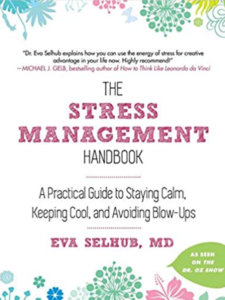Saying these are extremely stressful times is a guaranteed huge understatement. With COVID-19 still alive and spreading, the country on lockdown and people understandably worried about when, if ever, things will go back to normal, stress levels are becoming overwhelming. But with so much uncertainty, coupled with issues that are out of most people’s control, what can be done? Resiliency expert, Dr. Eva Selhub, M.D., claims quite a bit actually. So WellWell recently spoke with the author of The Stress Management Handbook: A Practical Guide to Staying Calm, Keeping Cool, and Avoiding Blow-Ups about how to best manage stress on a personal level and what can be learned from stress-filled situations.
What can we learn from stressful situations?
I think its important to understand stress psychology and how the brain actually functions. Stress is part of life and we’re wired to be able to manage it, but our brains also have the ability to adjust and adapt to stressful situations based on the manner in which we have reacted to them in the past.
This can help avoid future stress?
Of course. Your brain can basically look at your memories and actions in them as if it were a database collecting your entire past and learn and remembering how to react when stressful situations arise. So, if you train yourself to not get overwhelmed by stress. each time a new stressful moment presents itself you’ll be more prepared to handle it calmly and efficiently.
How does stress impact the body physically?
In times of duress, the brain perceives stress as something manageable but also something that’s threatening. That disparity can deplete your ability to think clearly. It moves you into fear-based behaviors with a fear-based mentality. That leads to a fight or flight response, creating increased heart rate, muscle tension, respirations, inflammation, etc.
Throughout your writing and in your lectures, you often maintain a lighthearted humorous tone. What do you think is the importance of levity in managing stress and handling stressful situations?
The physiological response of a negative mood or stressed mentality results in a conflicted mind and body relationship. We think less clearly and make poor decisions because we’re acting on fear or anger. That behavior is often times not only hurtful to ourselves but to others. So relaxing that impulse, whether it’s through love or humor can balance the mental divide. We then become more capable of handling adversity both physically, mentally and emotionally.
You’ve also written extensively about how improving diet can improve mental health. What role does diet play in managing stress?
It’s huge, honestly. Your brain and your body require fuel. Genuine fuel that we innately evolved within nature, not over-processed or chemically produced food. A healthy diet, featuring natural foods, helps us biologically operate most efficiently. Nutritious food nurtures not only our bodies but our brains.
In The Stress Management Handbook, you claim relationships, social support and culture are key components in managing stress. Do they help maintain or achieve a necessary personal balance?
Absolutely. In my opinion, the notion of managing stress is simply answering the question: “Do I have the resources to handle this.” Stress is caused any time something challenges a state of balance. That’s the simplest definition of stress. To combat it we need resources, a prime resource being other people to limit the impact. Humans evolved in packs and in groups to be able to build a community, a support system. Because there is no way we’d survive in the wilderness alone. Our brains know this to be true.
What advice do you have for managing stress while in quarantine, especially regarding that support system, the loved ones you may be cooped up with and possibly spending too much time with?
First, I think it’s important to go outside and connect with nature, even if you have to be cautious and keep your distance from others. Also, take time and space for yourself so to not feel overwhelmed or smothered. Most importantly though, it’s about speaking and living from a place of love, rather than a place of frustration or resentment. Avoiding triggers and feelings of resentment, frustration or anger by focusing on what you can control and your own mindfulness.
 About Dr. Eva Selhub, M.D.
About Dr. Eva Selhub, M.D.
Dr. Eva Selhub is an internationally recognized expert, physician, author, speaker and consultant in the fields of stress, resilience, mind-body medicine and working with the natural environment to achieve maximum health and well-being.
Learn more at www.drselhub.com












